河北省武邑中学2015-2016学年高二上学期周考(八)英语试题
河北省武邑中学高二英语上学期周考试题(11.20)
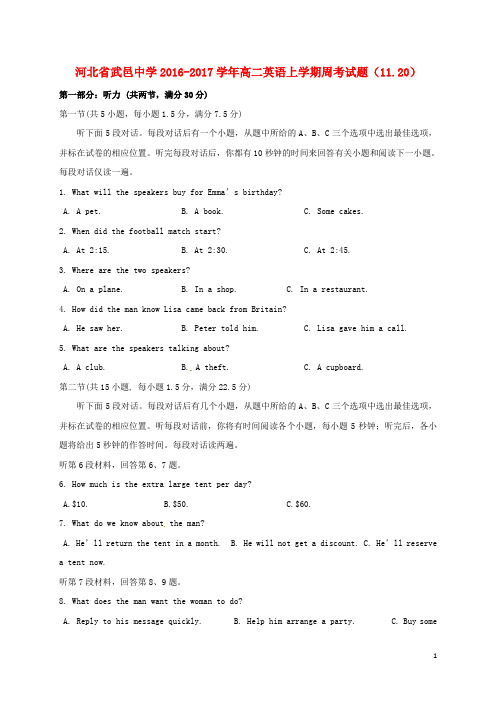
河北省武邑中学2016-2017学年高二英语上学期周考试题(11.20)第一部分:听力 (共两节,满分30分)第一节(共5小题,每小题1.5分,满分7.5分)听下面5段对话。
每段对话后有一个小题,从题中所给的A、B、C三个选项中选出最佳选项,并标在试卷的相应位置。
听完每段对话后,你都有10秒钟的时间来回答有关小题和阅读下一小题。
每段对话仅读一遍。
1. What will the speakers buy for Emma’s birthday?A. A pet.B. A book.C. Some cakes.2. When did the football match start?A. At 2:15.B. At 2:30.C. At 2:45.3. Where are the two speakers?A. On a plane.B. In a shop.C. In a restaurant.4. How did the man know Lisa came back from Britain?A. He saw her.B. Peter told him.C. Lisa gave him a call.5. What are the speakers talking about?A. A club.B. A theft.C. A cupboard.第二节(共15小题, 每小题1.5分,满分22.5分)听下面5段对话。
每段对话后有几个小题,从题中所给的A、B、C三个选项中选出最佳选项,并标在试卷的相应位置。
听每段对话前,你将有时间阅读各个小题,每小题5秒钟;听完后,各小题将给出5秒钟的作答时间。
每段对话读两遍。
听第6段材料,回答第6、7题。
6. How much is the extra large tent per day?A.$10.B.$50.C.$60.7. What do we know about the man?A. He’ll return the tent in a month.B. He will not get a discount.C. He’ll reserve a tent now.听第7段材料,回答第8、9题。
河北省武邑中学高二英语上学期周考试题(11.6)
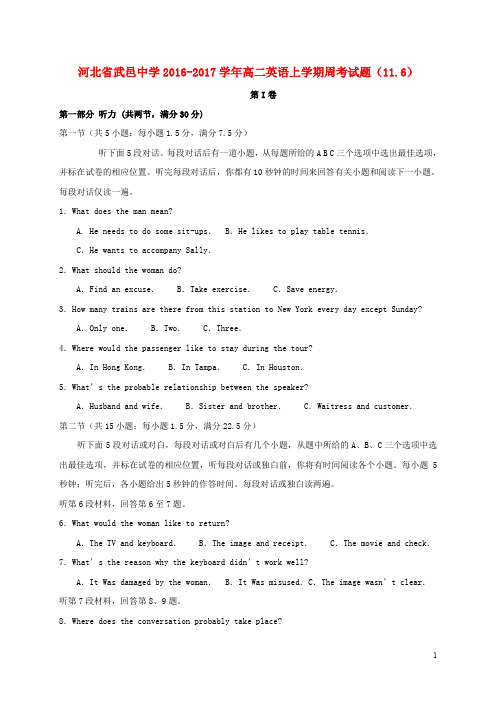
河北省武邑中学2016-2017学年高二英语上学期周考试题(11.6)第I卷第一部分听力 (共两节,满分30分)第一节(共5小题:每小题1.5分,满分7.5分)听下面5段对话。
每段对话后有一道小题,从每题所给的A B C三个选项中选出最佳选项,并标在试卷的相应位置。
听完每段对话后,你都有10秒钟的时间来回答有关小题和阅读下一小题。
每段对话仅读一遍。
1.What does the man mean?A. He needs to do some sit-ups. B.He likes to play table tennis.C.He wants to accompany Sally.2.What should the woman do?A.Find an excuse. B.Take exercise. C.Save energy.3.How many trains are there from this station to New York every day except Sunday?A.Only one. B.Two. C.Three.4.Where would the passenger like to stay during the tour?A.In Hong Kong. B.In Tampa. C.In Houston.5.What’s the probable relationship between the speaker?A.Husband and wife. B.Sister and brother. C.Waitress and customer.第二节(共15小题;每小题1.5分,满分22.5分)听下面5段对话或对白,每段对话或对白后有几个小题,从题中所给的A、B、C三个选项中选出最佳选项,并标在试卷的相应位置,听每段对话或独白前,你将有时间阅读各个小题。
每小题5秒钟;听完后,各小题给出5秒钟的作答时间。
河北省武邑中学高二英语上学期入学考试试题

武邑中学2016-2016学年高二上学期入学考试英语试题注意:1、本试卷分第Ⅰ卷(选择题)和第Ⅱ卷(非选择题)两部分,满分150 分。
考试时间:120分钟。
答卷前,考生务必将自己的姓名和考号填写或填涂在答题卷指定的位置。
2、选择题答案用2B铅笔把答题卡上对应题目的答案标号涂黑;如需改动,用橡皮擦干净后,再选涂其他答案;不能答在试题卷上。
3、主观题必须用黑色字迹的钢笔或签字笔在答题卷上作答,答案必须写在答题卷各题目指定区域内的相应位置上,超出指定区域的答案无效;如需改动,先划掉原来的答案,然后再写上新的答案。
第Ⅰ卷第一节(共5小题:每小题1.5分,满分7.5分)听下面5段对话。
每段对话后有一道小题,从每题所给的A B C三个选项中选出最佳选项,并标在试卷的相应位置。
听完每段对话后,你都有10秒钟的时间来回答有关小题和阅读下一小题。
每段对话仅读一遍。
1.Why does the man look sleepy today?A.Because he couldn’t sleep well last night.B.Because he spent too much time on the computer.C.Because he kept coughing all night.2.What has the man bought for his wife?A.Tennis shoes. B.Music records. C.Nothing yet.3.What’s the weather like today?A.Rainy in the morning.sunny in the afternoon.B.Rainy in the morning,cloudy in the afternoon.C.Bad in the morning,lovely in the afternoon.4.When does the conversation take place?A.5:15. B.5:30. C.5:45.5.Why hasn’t the nigh found any books on genetic engineering?A.Books of that kind might have been sold out. B.The man came early.C.Books on this shelf are lost.第二节(共15小题;每小题1.5分,满分22.5分)听下面5段对话或对白,每段对话或对白后有几个小题,从题中所给的A、B、C三个选项中选出最佳选项,并标在试卷的相应位置,听每段对话或独白前,你将有时间阅读各个小题。
河北省武邑中学2015-2016学年高二上学期英语寒假作业8 Word版含答案.doc
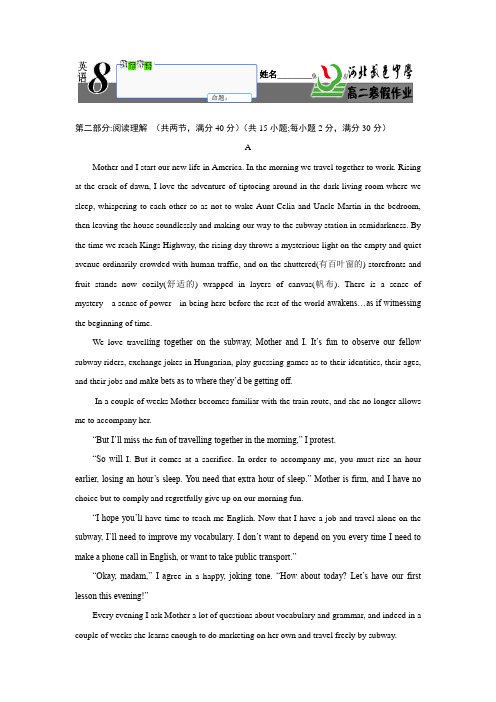
第二部分:阅读理解 (共两节,满分40分)(共15小题;每小题2分,满分30分)AMother and I start our new life in America. In the morning we travel together to work. Rising at the crack of dawn, I love the adventure of tiptoeing around in the dark living room where we sleep, whispering to each other so as not to wake Aunt Celia and Uncle Martin in the bedroom, then leaving the house soundlessly and making our way to the subway station in semidarkness. By the time we reach Kings Highway, the rising day throws a mysterious light on the empty and quiet avenue ordinarily crowded with human traffic, and on the shuttered(有百叶窗的) storefronts and fruit stands now cozily(舒适的) wrapped in layers of canvas(帆布). There is a sense of mystery---a sense of power---in being here before the rest of the world awakens…as if witnessing the beginning of time.We love travell ing together on the subway, Mother and I. It’s fun to observe our fellow subway riders, exchange jokes in Hungarian, play guessing games as to their identities, their ages, and their jobs and m ake bets as to where they’d be getting off.In a couple of weeks Mother becomes familiar with the train route, and she no longer allows me to accompany her.“But I’ll miss the fu n of travelling together in the morning,” I protest.“So will I. But it comes at a sacrifice. In order to accompany me, you must rise an hour earlier, losing an hour’s sleep. You need that extra hour of sleep.” Mother is firm, and I have no choice but to comply and regretfully give up on our morning fun.“I hope you’l l have time to teach me English. Now that I have a job and travel alone on the subway, I’ll need to improve my vocabulary. I don’t want to depend on you every time I need to make a phone call in English, or want to take public transport.”“Okay, madam,” I ag ree in a hap py, joking tone. “How about today? Let’s have our first lesson this evening!”Every evening I ask Mother a lot of questions about vocabulary and grammar, and indeed in a couple of weeks she learns enough to do marketing on her own and travel freely by subway. 命题:姓名_______21. Which detail from the text shows that the author is excited about her life in America?A. Her resistance to the growing independence of her mother.B. Her acceptance of why she can no longer accompany her mother.C. Her description of rising early to ride the subway with her mother.D. Her discipline to work on language lessons every day with her mother22. Which of the fol lowing describes the author’s attitude towards her mother?A. Supportive.B. Disrespectful.C. Sympathetic.D. Angry.23. The text is most probably taken from ___________.A. a review of a b ookB. a book about one’s life storyC. a travel magazineD. a handbook for foreigners.BWelcome to the world of multitasking---a place where the measure of a person is how many jobs they can perform at the same time. In fact, if experts are to be believed multitasking is a disastrous idea.One of the opponents(反对者) of multitasking is Dr. Clifford Nass, a professor at Stanford University. “People who multitask frequently are less able to pay attention; they are worse at managing their memory,” he said. In his opinion, the loss that we get with multitasking is harmless in some situations, for example, part of doing business in the digital w orld; but you can’t do serious work like writing, thinking or solving an important problem this way. You do worse even as you think you’re doing better. All the time the research points to a simple fact: the brain cannot cope. When you stop midway through composing a report to check an email, you force your brain to stop and regroup. It is like pressing the pause button during a movie, meaning the film takes longer to watch.And according to Dr. Nass, the problems extend beyond the brain. Young people who f requently multitask are not as socially and emotionally healthy as those who don’t. They just feel more emotionally satisfied and the feeling is so good and they are bound to desire it again. Todd Oppenheimer, a writer said, “We’ve become a very short-term society and don’t reward people for taking a lot of time on something.” He fears we may end up losing the next generation of great thinkers. “It’s really unfortunate because the long-term challenges of our world---environmental issues, financial issues---require people to think wisely about the long-term consequences of whatthey do. And it’s no coincidence that the kind of people who do think long-term don’t multitask.24. According to Dr. Nass, multitasking ________.A. contributes to memorizing various thingsB. may result in losing the next generation of great thinkersC. can be performed using digital toolsD. makes the performance emotionally affected only25. From the passage, we can tell ________.A. we mistakenly belie ve that we’re doing better by switching between tasksB. multitasking does harm to us in every areaC. for every task you add to your multitasking, you can finish your goal more quicklyD. the loss that we get with multitasking is harmless26. Which of the following is a multitasking addict?A. You watch from start to finish without distraction when playing a DVD.B. You have your office desk covered with paperwork from various unfinished projects.C. You feel that when you try to do too much at once, the result always suffers.D. You turn your cell phone to silence when you are out to dine with friends.27. The author mainly wants to tell us _________.A. it is more efficient to do things all in a mixed wayB. it takes longer for us to become a great thinkerC. we shouldn’t be lazy if we want to accomplish many tasksD. the less you switch, the better you doCHere’s a new warning from health experts: Sitting is deadly.Scientists are increasingly warning that sitting for prolonged periods —even if you also exercise regularly —could be bad for your health. And it doesn’t matter where the sitting takes place — at the office, at school, in the car or before a computer or TV — just the overall number of hours it occurs. Several studies suggest people who spend most of their days sitting are more likely to be fat, have a heart attack or even die.In an editorial published this week in the British Journal of Sports Medicine, Elin Ekblom-Bak of the Swedish School of Sport and Health Sciences suggested that authoritiesrethink how they define physical activity to highlight the dangers of sitting.While health officials have issued guidelines recommending minimum (最少的) amounts of physical activity, they haven’t suggested people try to limit how much time they spend in a s eated position.“After four hours of sitting, the body starts to send harmful signals,” Ekblom-Bak said. She explained that genes regulating (调节) the amount of glucose (葡萄糖) and fat in the body start to shut down.Even for people who exercise, spending long periods of time sitting at a desk is still harmful. Tim Armstrong, a physical activity expert at the World Health Organization, said people who exercise every day — but still spend a lot of time sitting — might get more benefit if that exercise were spread across the day, rather than in a single bout (一回).Still, in a study published last year that tracked more than 17,000 Canadians for about a dozen years, researchers found people who sat more had a higher death risk, whether or not they exercised.“We d o n’t have enough evidence yet to say how much sitting is bad,” said Peter Katzmarzyk of the Pennington Biomedical Research Center in Baton Rouge, who led the Canadian study. “But it seems the more you can get up and interrupt this sedentary (坐着的) behavior, the better.”Figures from a U.S. survey in 2003-2004 found Americans spend more than half their time sitting, from working at their desks to sitting in cars.Experts said more research is needed to figure out just how much sitting is dangerous, and what might be possible to offset those effects.“People sho uld ke ep exercising because that has a lot of benefits,” Ekblom-Bak said. “But when they’re in the office, they should try to interrupt sitting as often as possible,” she said.28. What is the best title for the text?A. Not Sitting Too Much While WorkingB. How To Avoid Sitting Too MuchC. Sitting Too Much Could Be DeadlyD. More And More People Sit Too Much29. According to the research, ____________.A. the more time you spend in exercising in a single bout, the healthier you will beB. those who often sit too much are sure to grow fat or suffer from a heart attackC. regular exercise is effective to get rid of the side effect of sitting too muchD. you had better not sit for more than four hours in a single bout30. How does the danger of sitting too much affect the human body?A. It causes the genes to fail to balance the glucose and fat in the body.B. It increases glucose and fat in the body.C. It makes a person unable to exercise long enough in a day.D. It results in death.31. The underlined wor d “offset” in paragraph 10 probably means __________.A. improveB. balanceC. ignoreD. achieve第三部分:英语知识运用(共两节,满分45分)第一节完形填空(共20小题;每小题1.5分,满分30分)Our children grew up on jelly(果酱) sandwiches. Even my husband and I sometimes have one late at night with a glass of milk.I wasn’t the jelly maker in this 41 . My mother-in-law was. The only contribution I made to the jelly making was to 42 baby food jars, which my mother-in-law would 43 with the tasty gel(凝胶) and send back home with us. For the past 22 years, 44 I wanted to make a jelly sandwich, all I had to do was 45 one of those little jars of jelly. Jelly making was just a way of life for my mother-in-law. She always followed the same 46 -- from picking the fruit to setting the 47 jelly on the homemade shelves.My mother-in-law passed away last December. Among the things in the house to be 48 by her children were the 49 canned goods. Each of her children chose from the many jars of tomato juice, green beans and jelly. When my husband 50 his jars home, we carefully put them away in our kitchen.The other day I reached the 51 for some jelly, and there it was. Sitting all alone on the far side of the shelf was a small jar. The lid was rusty. As I picked up the jar, I suddenly realized something that I had 52 to see earlier. Yes, this was the 53 jar we would ever have from the patient, 54 hands of my mother-in-law. It seemed like such a 55 thing, and most days it was something that was taken for granted. But today it seemed a valuable 56 . I put the jelly back on the shelf.We have many things that 57 belonged to my mother-in-law. These are the kinds of things that we expect to pass on to our childr en. But I’m just not58 to give up this last jelly jar, andall the 59 its presence allows me to hold onto. The jar of jelly won’t keep that60 . It will either have to be eaten or thrown out… but not today.41. A. market B. village C. family D. group42. A. save B. throw C. choose D. paint43. A. fill B. cover C. provide D. decorate44. A. before B. whenever C. though D. since45. A. turn on B take up C. pick out D. reach for46. A. example B. routine C. dream D. rule47. A. mixed B. finished C. changed D. boiled48. A. destroyed B. moved C. donated D. divided49. A. tasty B. expensive C. common D. suitable50. A. left B. packed C. sent D. brought51. A. kitchen B. hall C. market D. store52. A. forgotten B. expressed C. considered D. failed53. A. large B. particular C. delicious D. last54. A. poor B. painful C. loving D. shaking55. A. small B. new C. strange D. good56. A. experience B. treasure C. opportunity D. prize57. A. already B. once C. only D. still58. A. afraid B. eager C. ready D. upset59. A. lessons B. memories C. efforts D. feelings60. A. safe B. light C. soft D. long寒假作业8阅读21-23. CAB 24-27. CABD 28-31. CDAB 32-35 CBAD七选五36-40 CGFAD完形41-45 C A A B D 46-50 B B D A D51-55 A D D C A 56-60 B B C B D。
高二英语上学期周考试题(1.3)

河北省武邑中学2015-2016学年高二英语上学期周考试题(1.3)第Ⅰ卷第一节(共5小题:每小题1.5分,满分7.5分)听下面5段对话。
每段对话后有一道小题,从每题所给的A B C三个选项中选出最佳选项,并标在试卷的相应位置。
听完每段对话后,你都有10秒钟的时间来回答有关小题和阅读下一小题。
每段对话仅读一遍。
1.Which country is Jack going to study in?A.China. B.America. C.England.2.Why can’t the man reach that music book?A.He is short. B.The book is too high. C.There is nobody to help.3.Why was the man late?A.It was too cold. B.His car broke down. C.He warmed his ear up.4.What had happened to the man?A.His bag was stolen. B.He lost his passport. C.He worried about his wallet.5.What advice does the man give to the woman?A.Swimming. B.Walking. C.Running.第二节(共15小题;每小题1.5分,满分22.5分)听下面5段对话或对白,每段对话或对白后有几个小题,从题中所给的A、B、C三个选项中选出最佳选项,并标在试卷的相应位置,听每段对话或独白前,你将有时间阅读各个小题。
每小题5秒钟;听完后,各小题给出5秒钟的作答时间。
每段对话或独白读两遍。
听第6段材料,回答第6至7题。
6.What’s the relationship between John and Ann?A.Classmates. B.Friends. C.Lover$.7.Why did John have an argument with Arm?A.John lost his temper. B.Ann met her boyfriend.C.Ann canceled the planned trip.听第7段材料,回答第8、9题。
[推荐学习]高二英语上学期周考试题(1.17)
![[推荐学习]高二英语上学期周考试题(1.17)](https://img.taocdn.com/s3/m/480747dd7c1cfad6185fa71e.png)
武邑中学2015—2016学年高二周日考试(1.17)英语试卷说明:1.考试时间120分钟,满分150分。
2.将卷Ⅰ答案用2B铅笔涂在答题卡上,卷Ⅱ用蓝黑钢笔或圆珠笔答在答题纸上。
3.Ⅱ卷卷头和答题卡均填涂本次考试的考号,不要误填学号,答题卡占后5位。
卷Ⅰ(选择题共105分)第一部分:听力(共两节,满分20分)第一节(共5小题;每小题1分,满分5分)听下面5段对话。
每段对话后有一个小题,从题中所给的A、B、C三个选项中选出最佳选项,并标在试卷的相应位置。
听完每段对话后,你都有10秒钟的时间来回答有关小题和阅读下一小题。
每段对话仅读一遍。
1.What does the woman suggest?A. Waiting on the corner.B. Taking a taxi.C. Calling thehotel.2.Where are the speakers?A. At home.B. In a flower shop.C. At school. 3.What will the man probably do?A. Have dinner.B. Clean the table.C. Read the notebook. 4.How many countries has the woman been to so far?A. Four.B. Three.C. Two.5.When does the bakery close?A. At 7:00.B. At 6:55.C. At 7:30.第二节(共15小题;每小题1分,满分15分)听下面5段对话或独白。
每段对话或独白后有几个小题,从每题所给的A、B、C三个选项中选出最佳选项,并标在试卷的相应位置。
听每段对话或独白前,你将有时间阅读各个小题,每小题5秒钟;听完后,各小题将给出5秒钟的作答时间。
每段对话或独白读两遍。
听第6段材料,回答第6至8题。
[学习资料]高中二年级英语上学期周考试题(1.17)
![[学习资料]高中二年级英语上学期周考试题(1.17)](https://img.taocdn.com/s3/m/0f64c8ade53a580216fcfea3.png)
武邑中学2015—2016学年高二周日考试(1.17)英语试卷说明:1.考试时间120分钟,满分150分。
2.将卷Ⅰ答案用2B铅笔涂在答题卡上,卷Ⅱ用蓝黑钢笔或圆珠笔答在答题纸上。
3.Ⅱ卷卷头和答题卡均填涂本次考试的考号,不要误填学号,答题卡占后5位。
卷Ⅰ(选择题共105分)第一部分:听力(共两节,满分20分)第一节(共5小题;每小题1分,满分5分)听下面5段对话。
每段对话后有一个小题,从题中所给的A、B、C三个选项中选出最佳选项,并标在试卷的相应位置。
听完每段对话后,你都有10秒钟的时间来回答有关小题和阅读下一小题。
每段对话仅读一遍。
1.What does the woman suggest?A. Waiting on the corner.B. Taking a taxi.C. Calling thehotel.2.Where are the speakers?A. At home.B. In a flower shop.C. At school. 3.What will the man probably do?A. Have dinner.B. Clean the table.C. Read the notebook. 4.How many countries has the woman been to so far?A. Four.B. Three.C. Two.5.When does the bakery close?A. At 7:00.B. At 6:55.C. At 7:30.第二节(共15小题;每小题1分,满分15分)听下面5段对话或独白。
每段对话或独白后有几个小题,从每题所给的A、B、C三个选项中选出最佳选项,并标在试卷的相应位置。
听每段对话或独白前,你将有时间阅读各个小题,每小题5秒钟;听完后,各小题将给出5秒钟的作答时间。
每段对话或独白读两遍。
听第6段材料,回答第6至8题。
河北省武邑中学高二上学期周考(12.27)英语试题
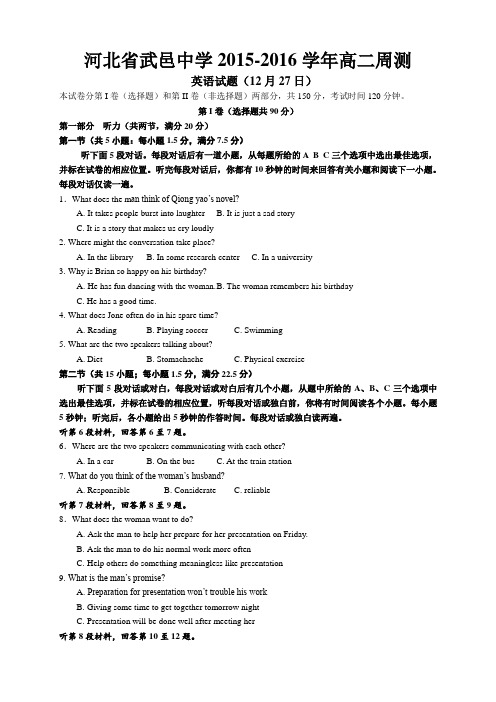
河北省武邑中学2015-2016学年高二周测英语试题(12月27日)本试卷分第I卷(选择题)和第II卷(非选择题)两部分,共150分,考试时间120分钟。
第I卷(选择题共90分)第一部分听力(共两节,满分20分)第一节(共5小题:每小题1.5分,满分7.5分)听下面5段对话。
每段对话后有一道小题,从每题所给的A B C三个选项中选出最佳选项,并标在试卷的相应位置。
听完每段对话后,你都有10秒钟的时间来回答有关小题和阅读下一小题。
每段对话仅读一遍。
1.What does the m an think of Qiong yao’s novel?A.It takes people burst into laughterB. It is just a sad storyC. It is a story that makes us cry loudly2.Where might the conversation take place?A.In the libraryB. In some research centerC. In a university3.Why is Brian so happy on his birthday?A.He has fun dancing with the woman.B. The woman remembers his birthdayC. He has a good time.4.What does Jone often do in his spare time?A.ReadingB. Playing soccerC. Swimming5.What are the two speakers talking about?A. DietB. StomachacheC. Physical exercise第二节(共15小题;每小题1.5分,满分22.5分)听下面5段对话或对白,每段对话或对白后有几个小题,从题中所给的A、B、C三个选项中选出最佳选项,并标在试卷的相应位置,听每段对话或独白前,你将有时间阅读各个小题。
高二英语月考试题及答案-武邑中学2015-2016学年高二上学期周考(1.17)试题
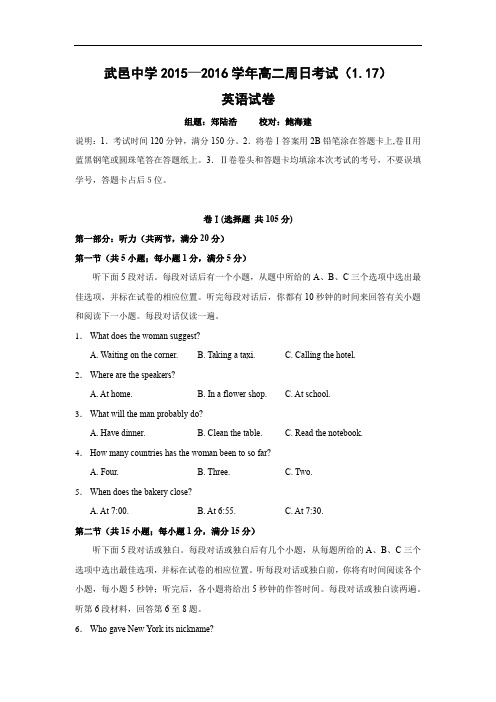
武邑中学2015—2016学年高二周日考试(1.17)英语试卷组题:郑陆浩校对:鲍海建说明:1.考试时间120分钟,满分150分。
2.将卷Ⅰ答案用2B铅笔涂在答题卡上,卷Ⅱ用蓝黑钢笔或圆珠笔答在答题纸上。
3.Ⅱ卷卷头和答题卡均填涂本次考试的考号,不要误填学号,答题卡占后5位。
卷Ⅰ(选择题共105分)第一部分:听力(共两节,满分20分)第一节(共5小题;每小题1分,满分5分)听下面5段对话。
每段对话后有一个小题,从题中所给的A、B、C三个选项中选出最佳选项,并标在试卷的相应位置。
听完每段对话后,你都有10秒钟的时间来回答有关小题和阅读下一小题。
每段对话仅读一遍。
1.What does the woman suggest?A. Waiting on the corner.B. Taking a taxi.C. Calling the hotel.2.Where are the speakers?A. At home.B. In a flower shop.C. At school.3.What will the man probably do?A. Have dinner.B. Clean the table.C. Read the notebook.4.How many countries has the woman been to so far?A. Four.B. Three.C. Two.5.When does the bakery close?A. At 7:00.B. At 6:55.C. At 7:30.第二节(共15小题;每小题1分,满分15分)听下面5段对话或独白。
每段对话或独白后有几个小题,从每题所给的A、B、C三个选项中选出最佳选项,并标在试卷的相应位置。
听每段对话或独白前,你将有时间阅读各个小题,每小题5秒钟;听完后,各小题将给出5秒钟的作答时间。
每段对话或独白读两遍。
听第6段材料,回答第6至8题。
【英语】河北省武邑中学2015-2016学年高二上学期周考试题(1.3)
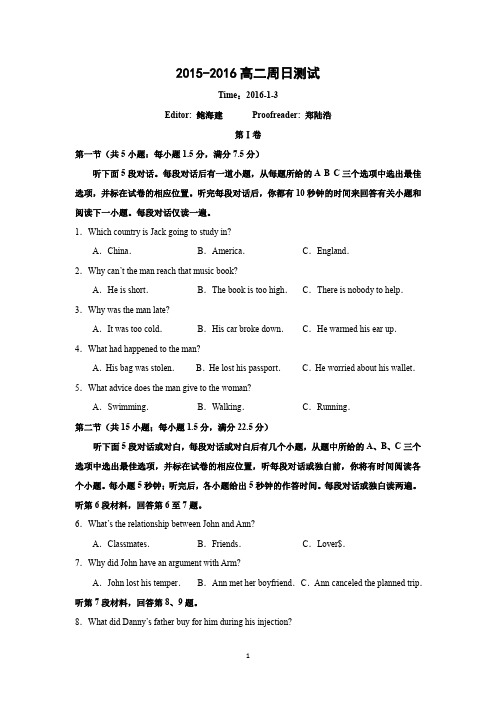
2015-2016高二周日测试Time:2016-1-3Editor: 鲍海建Proofreader: 郑陆浩第Ⅰ卷第一节(共5小题:每小题1.5分,满分7.5分)听下面5段对话。
每段对话后有一道小题,从每题所给的A B C三个选项中选出最佳选项,并标在试卷的相应位置。
听完每段对话后,你都有10秒钟的时间来回答有关小题和阅读下一小题。
每段对话仅读一遍。
1.Which country is Jack going to study in?A.China.B.America.C.England.2.Why can’t the man reach that music book?A.He is short.B.The book is too high.C.There is nobody to help.3.Why was the man late?A.It was too cold.B.His car broke down.C.He warmed his ear up.4.What had happened to the man?A.His bag was stolen.B.He lost his passport.C.He worried about his wallet.5.What advice does the man give to the woman?A.Swimming.B.Walking.C.Running.第二节(共15小题;每小题1.5分,满分22.5分)听下面5段对话或对白,每段对话或对白后有几个小题,从题中所给的A、B、C三个选项中选出最佳选项,并标在试卷的相应位置,听每段对话或独白前,你将有时间阅读各个小题。
每小题5秒钟;听完后,各小题给出5秒钟的作答时间。
每段对话或独白读两遍。
听第6段材料,回答第6至7题。
6.What’s the relationship between John and Ann?A.Classmates.B.Friends.C.Lover$.7.Why did John have an argument with Arm?A.John lost his temper.B.Ann met her boyfriend.C.Ann canceled the planned trip.听第7段材料,回答第8、9题。
【小初高学习】高二英语上学期周考试题(1.17)
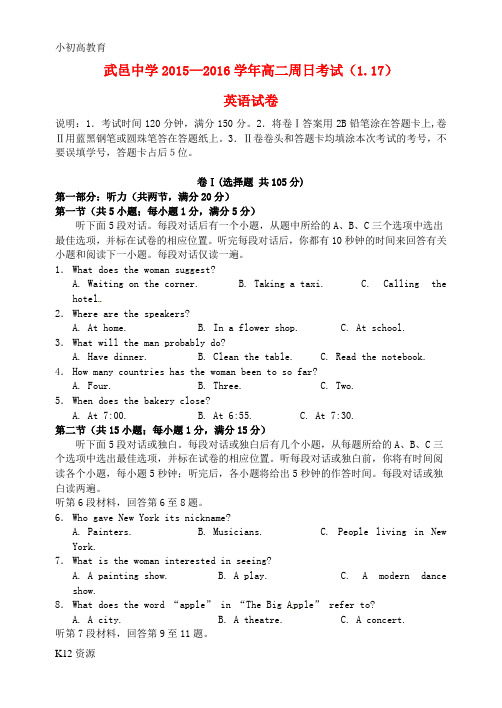
武邑中学2015—2016学年高二周日考试(1.17)英语试卷说明:1.考试时间120分钟,满分150分。
2.将卷Ⅰ答案用2B铅笔涂在答题卡上,卷Ⅱ用蓝黑钢笔或圆珠笔答在答题纸上。
3.Ⅱ卷卷头和答题卡均填涂本次考试的考号,不要误填学号,答题卡占后5位。
卷Ⅰ(选择题共105分)第一部分:听力(共两节,满分20分)第一节(共5小题;每小题1分,满分5分)听下面5段对话。
每段对话后有一个小题,从题中所给的A、B、C三个选项中选出最佳选项,并标在试卷的相应位置。
听完每段对话后,你都有10秒钟的时间来回答有关小题和阅读下一小题。
每段对话仅读一遍。
1.What does the woman suggest?A. Waiting on the corner.B. Taking a taxi.C. Calling thehotel.2.Where are the speakers?A. At home.B. In a flower shop.C. At school. 3.What will the man probably do?A. Have dinner.B. Clean the table.C. Read the notebook. 4.How many countries has the woman been to so far?A. Four.B. Three.C. Two.5.When does the bakery close?A. At 7:00.B. At 6:55.C. At 7:30.第二节(共15小题;每小题1分,满分15分)听下面5段对话或独白。
每段对话或独白后有几个小题,从每题所给的A、B、C三个选项中选出最佳选项,并标在试卷的相应位置。
听每段对话或独白前,你将有时间阅读各个小题,每小题5秒钟;听完后,各小题将给出5秒钟的作答时间。
每段对话或独白读两遍。
听第6段材料,回答第6至8题。
高二英语上学期周考试题(1.17)-人教版高二全册英语试题

武邑中学2015—2016学年高二周日考试〔1.17〕英语试卷说明:1.考试时间120分钟,总分为150分。
2.将卷Ⅰ答案用2B铅笔涂在答题卡上,卷Ⅱ用蓝黑钢笔或圆珠笔答在答题纸上。
3.Ⅱ卷卷头和答题卡均填涂本次考试的考号,不要误填学号,答题卡占后5位。
卷Ⅰ(选择题共105分)第一局部:听力〔共两节,总分为20分〕第一节〔共5小题;每一小题1分,总分为5分〕听下面5段对话。
每段对话后有一个小题,从题中所给的A、B、C三个选项中选出最优选项,并标在试卷的相应位置。
听完每段对话后,你都有10秒钟的时间来回答有关小题和阅读下一小题。
每段对话仅读一遍。
1.What does the woman suggest?A. Waiting on the corner.B. Taking a taxi.C. Calling thehotel.2.Where are the speakers?A. At home.B. In a flower shop.C. At school. 3.What will the man probably do?A. Have dinner.B. Clean the table.C. Read the notebook. 4.How many countries has the woman been to so far?A. Four.B. Three.C. Two.5.When does the bakery close?A. At 7:00.B. At 6:55.C. At 7:30.第二节〔共15小题;每一小题1分,总分为15分〕听下面5段对话或独白。
每段对话或独白后有几个小题,从每题所给的A、B、C三个选项中选出最优选项,并标在试卷的相应位置。
听每段对话或独白前,你将有时间阅读各个小题,每一小题5秒钟;听完后,各小题将给出5秒钟的作答时间。
每段对话或独白读两遍。
听第6段材料,回答第6至8题。
16学年上学期高二周考(1
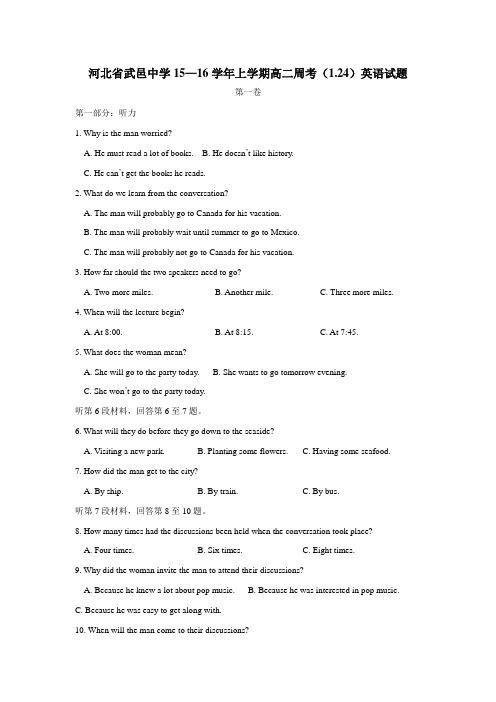
河北省武邑中学15—16学年上学期高二周考(1.24)英语试题第一卷第一部分:听力1. Why is the man worried?A.He must read a lot of books.B. He doesn’t like history.C. He can’t get the books he reads.2. What do we learn from the conversation?A. The man will probably go to Canada for his vacation.B. The man will probably wait until summer to go to Mexico.C. The man will probably not go to Canada for his vacation.3. How far should the two speakers need to go?A. Two more miles.B. Another mile.C. Three more miles.4. When will the lecture begin?A. At 8:00.B. At 8:15.C. At 7:45.5. What does the woman mean?A. She will go to the party today.B. She wants to go tomorrow evening.C. She won’t go to the party today.听第6段材料,回答第6至7题。
6. What will they do before they go down to the seaside?A. Visiting a new park.B. Planting some flowers.C. Having some seafood.7. How did the man get to the city?A. By ship.B. By train.C. By bus.听第7段材料,回答第8至10题。
河北省武邑中学高二英语上学期入学考试试题
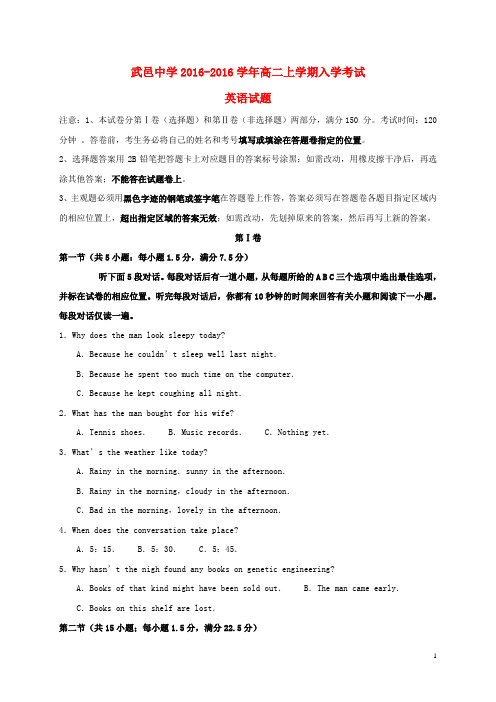
武邑中学2016-2016学年高二上学期入学考试英语试题注意:1、本试卷分第Ⅰ卷(选择题)和第Ⅱ卷(非选择题)两部分,满分150 分。
考试时间:120分钟。
答卷前,考生务必将自己的姓名和考号填写或填涂在答题卷指定的位置。
2、选择题答案用2B铅笔把答题卡上对应题目的答案标号涂黑;如需改动,用橡皮擦干净后,再选涂其他答案;不能答在试题卷上。
3、主观题必须用黑色字迹的钢笔或签字笔在答题卷上作答,答案必须写在答题卷各题目指定区域内的相应位置上,超出指定区域的答案无效;如需改动,先划掉原来的答案,然后再写上新的答案。
第Ⅰ卷第一节(共5小题:每小题1.5分,满分7.5分)听下面5段对话。
每段对话后有一道小题,从每题所给的A B C三个选项中选出最佳选项,并标在试卷的相应位置。
听完每段对话后,你都有10秒钟的时间来回答有关小题和阅读下一小题。
每段对话仅读一遍。
1.Why does the man look sleepy today?A.Because he couldn’t sleep well last night.B.Because he spent too much time on the computer.C.Because he kept coughing all night.2.What has the man bought for his wife?A.Tennis shoes. B.Music records. C.Nothing yet.3.What’s the weather like today?A.Rainy in the morning.sunny in the afternoon.B.Rainy in the morning,cloudy in the afternoon.C.Bad in the morning,lovely in the afternoon.4.When does the conversation take place?A.5:15. B.5:30. C.5:45.5.Why hasn’t the nigh found any books on genetic engineering?A.Books of that kind might have been sold out. B.The man came early.C.Books on this shelf are lost.第二节(共15小题;每小题1.5分,满分22.5分)听下面5段对话或对白,每段对话或对白后有几个小题,从题中所给的A、B、C三个选项中选出最佳选项,并标在试卷的相应位置,听每段对话或独白前,你将有时间阅读各个小题。
- 1、下载文档前请自行甄别文档内容的完整性,平台不提供额外的编辑、内容补充、找答案等附加服务。
- 2、"仅部分预览"的文档,不可在线预览部分如存在完整性等问题,可反馈申请退款(可完整预览的文档不适用该条件!)。
- 3、如文档侵犯您的权益,请联系客服反馈,我们会尽快为您处理(人工客服工作时间:9:00-18:30)。
2015-2016学年河北武邑中学高二第八次周日考试英语试题注意:本试卷分为卷I(选择题)和卷II(非选择题)两部分,满分150分,考试时间120分钟;所有答案一律做在答题卷上。
第I卷第一部分听力(共两节,共20小题,每小题1.5分,满分30分)做题时,先将答案标在试卷上。
录音内容结束后,你将有两分钟的时间将试卷上的答案转涂到答题卡上。
第一节(共5小题;每小题1.5分,满分7.5分)听下面5段对话。
每段对话后有一个小题,从题中所给的A、B、C三个选项中选出最佳选项,并标在试卷的相应位置。
听完每段对话后,你都有10秒钟的时间来回答有关小题和阅读下一小题。
每段对话仅读一遍第一部分听力(共两节,满分30分)1. When did the flood happen?A. Around 2:00 am.B. About 12:00.C. About 2:00 pm.2. What does the man think of WeChat?A. Convenient.B. Exciting.C. Advanced.3. What does the man ask for?A. A team.B. A player.C. An agent.4. What does the man mean?A. Grandpa is on the tour.B. Grandpa needs more sleep.C. Grandpa is dead.5. What do the two speakers need?A. Some repairs.B. A new house.C. Lucky stars.第二节(共15小题;每小题1.5分,满分22.5分)听下面5段对话或独白。
每段对话或独白后有几个小问题,从题中所给的A、B、C三个选项中选出最佳选项,并标在试卷的相应位置,听每段对话或独白前,你将有时间阅读各小题,每小题5秒钟;听完后,各小题将给出5秒钟的作答时间。
每段对话或独白读两遍。
听第6段材料,回答第6、7题。
6. Where does the conversation take place?A. In a palace.B. In a restaurant.C. In a hall.7. What can we know about the man?A. He is a middle-school boy.B. He is over 18 years old.C. He is with the height of 1.6 metres.听第7段材料,回答第8、9题。
8. What does the woman want the space to work as?A. Stores.B. Offices.C. Hotels.9. What will the woman try to do?A. Change the city‘s urban planners‘ minds.B. Replace the space usage.C. Make attractive commercials.听第8段材料,回答10至12题。
10. Which sport is mentioned that is related to Monica Guo?A. Jumping.B. Football.C. Rock climbing.11. Where did Monica learning surfing?A. In Australia.B. In Hong Kong.C. In Guilin.12. Why does she stay and live in Hainan now?A. She works there.B. She enjoys surfing there.C. She is trained there.听第9段材料,回答第13至16题。
13. What has the man done?A. Finished his paper.B. Copied others‘ papers.C. Started the paper.14. What did the woman think would happen if one got caught cheating?A. Be kicked out of the school.B. Rewrite the homework.C. Fail the class.15. What example of cheating did the man mention?A. Paying for writing the papers.B. Copying the classmates‘ papers.C. Using the old papers as new ones.16. What is the woman‘s opinion about cheating?A. Why not do it?B. Would rather die than do it.C. Would like to have a try.听第10段材料,回答第17至20题。
17. What‘s Doctor Who?A. An American science television series.B. A British science television series.C. A British science fiction television series.18. What can we know about the Doctor Who stamps?A. They are for its 50th anniversary.B. There are 12 stamps in total.C. They show the people who have written the series.19. Who is Matt Smith?A. He played Doctor Who from 2012.B. He is the youngest actor to play the Doctor.C. He wrote storie s to celebrate Doctor Who‘s 50 th anniversary.20. Which is true about Doctor Who‘s 50th Anniversary Special?A. It‘s not a 3-D showB. It will be broadcast after November.C. The script remains a secret.第二部分:阅读理解(共20小题;每小题2分,满分40分)第一节(共15小题;每小题2分,满分30分)阅读下列短文,从每题所给的四个选项(A、B、C和D)中,选出最佳选项,并在答题卡上将该项涂黑。
AIn 1978, I was 18 and was working as a nurse in a small town about 270 km away from Sydney, Australia. I was looking forward to having five days off from duty. Unfortunately, the only one train a day back to my home in Sydney had already left. So I thought I‘d hitch a ride (搭便车).I waited by the side of the highway for three hours but no one stopped for me. Finally, a manwalked over and introduced himself as Gordon. He said that although he couldn‘t give me a lift, I should come back to his house for lunch. He noticed me standing for hours in the November heat and thought I must be hungry. I was doubtful as a young girl but he assured (使…放心)me I was safe, and he also offered to help me find a lift home afterwards. When we arrived at his house, he made us sandwiches. After lunch, he helped me find a lift home.Twenty-five years later, in 2003, while I was driving to a nearby town one day, I saw an elderly man standing in the glaring heat, trying to hitch a ride. I thought it was another chance to repay someone for the favour I‘d been given decades earlier. I pulled over and picked him up. I made him comfortable on the back seat and offered him some water.Aft er a few moments of small talk, the man said to me, ―You haven‘t changed a bit, even your red hair is still the same.‖I couldn‘t remember where I‘d met him. He then told me he was the man who had given me lunch and helped me find a lift all those years ago. It was Gordon.21. The author had to hitch a ride one day in 1978 because .A. her work delayed her trip to SydneyB. she missed the only train back homeC. she was going home for her holidaysD. the town was far away from Sydney22. Which of the following did Gordon do according to Paragraph 2?A. He helped the girl find a ride.B. He gave the girl a ride back home.C. He bought sandwiches for the girl.D. He watched the girl for three hours.23.The reason why the author offered a lift to the elderly man was that .A. she realized he was GordonB. she had known him for decadesC. she was going to the nearby townD. she wanted to repay the favour she once got24. What does the author want to tell the readers through the story?A. Those who give rides will be repaid.B. Good manners bring about happiness.C. Giving sometimes produces nice results.D. People should offer free rides to others.BMore than half of rich Americans have not shown their full wealth to their children,a new survey showed last Tuesday.The survey,published by the Bank of America, studied the rich with $3 million or more in assets.It found that ―surprisingly few of those surveyed have well-developed plans to preserve and pass on their assets to the ir children‖.The majority of the 457 people surveyed are selfmade,first-generation rich.Fifty-two percent of parents have chosen not to tell their children just how wealthy they are,and 15 percent have given away nothing about the family wealth.One in three parents said they had never thought to do it.They are worried that their children would become lazy,spend money freely,make bad decisions and even become a target for gold diggers.Only 34 percent strongly agreed that their children would be able to handle any inheritance(遗产)they plan to leave them.―There is an expectation about the wealthy parents that they have a responsibility to pass down their fortune to the next generation,‖said Sallie Krawcheck,president of the Global Wealth andInvestment Management of the Bank of America.―Our research,however,uncovered changing views of what one generation owes the next.‖The trend is led by the world's richest man Bill Gates,who promised in 2008 that he would leave his $58 billion fortune to the charity started by him and his wife,the Bill and Melinda Gates Foundation(基金会),and not to his children.―We want to give it back to society in the way that it will have the most positive impact,‖he said.Of his plans for his children,Gates said:―I will give the kids some money but not a meaningful percentage...they will need to work but they will feel reasonably taken care of.‖24.We can learn from the passage that ________.A.rich parents may not know how to manage their inheritanceB.rich parents don't equal rich kids,at least in the USC.American children don't get to inherit their parents' wealthD.poor children don't expect themselves to be as rich as their parents25.According to the survey,most rich Americans ________.A.think they owe their children nothingB.think it best to give their money back to societyC.doubt their children's ability to handle wealthD. are confident of their children's ability to handle wealth26.From the last paragraph,we can see that Bill Gates wants to show ________.A.the trend of leaving no inheritance to childrenB.the positive impact of charity on societyC.the way of giving back to societyD.the importance of independence for childrenCVacation is a time for refreshment. In work, w e are often called to think. Sometimes, it‘s good to give our brains a rest. Without a break, we may not be able to perform up to our potential. This can be a problem, not only for the employee, but for the employer as well.―The main benefit of vacation is for the worker to come back energized,‖ says Weaver. ―If they haven‘t had a break, then they‘re not coming back with new energy. They haven‘t had a chance to step back and get perspective(远景), and come back with renewed enthusiasm.‖Long working hours without a break, insecurity(不安)about one‘s job, and other work-related worries can lead to burnout and stress. Humans can usually adapt to pressure, but not for a limitless amount of time.―It is a problem of relating good workers and having them loyal to the firm while they‘re there,‖ says David Maume, PhD, professor of sociology at the University of Cincinnati. He says burnout can also affect employees‘ productivity, creativity, and effectiveness.In addition, high levels of stress are likely to be precursors (前兆) to depression, which can hit both the employer and employee‘s pocketbook. Even people who manager to remain productive at work can have problems. If they‘re always at work, then they‘re not with their family and friends. Ifthey‘re working while on vacation, for the time that they‘re on the job, they‘re not really present.An unbalanced emphasis on work can strain family and social life. When you come up for air, you may see that you‘re alone, or that your relationships have gone on without you.27. What‘s the main benefit of a vacation?A. The manager can be more creative.B. The worker can step back and get more excitedC. The worker can come back with new energy.D. The worker can adapt to pressure much better.28. The underlined word ―there‖ in the fourth paragraph probably refers to ________.A. the vacationB. the homeC. the universityD. the company29. When a worker is always at work, he is likely to get more and more__________ .A. absent-mindedB. energeticC. skillfulD. active30. Which of the following is the best title of the text?A. How to spend the vacation effectively.B. Why the workers need a vacation.C. How to deal with the daily pressure.D. Why the workers need new energy.DAlex Pang's amusing new book The Distraction Addiction addresses those of us who feel panic without a cellphone or computer. And that, he claims, is pretty much all of us. When we're not online, where we spend four months annually, we're engaged in the stressful work of trying to get online.The Distraction Addiction is not framed as a self-help book. It's a thoughtful examination of the danger of our computing overdose and a historical overview of how technological advances change consciousness. A "professional futurist", Pang urges an approach which he calls "contemplative (沉思的) computing." He asks that you pay full attention to "how your mind and body interact with computers and how your attention and creativity are influenced by technology."Pang's first job is to free you from common misconception that doing two things at once allows you to get more done. What is commonly called multitasking is, in fact, switch-tasking, and its harmful effects on productivity are well documented. Pang doesn't advocate returning to a preinternet world. Instead, he asks you to "take a more ecological (生态的) view of your relationships with technologies and look for ways devices or media may be making specific tasks easier or faster but at the same time making your work and life harder."The Distraction Addiction is particularly fascinating on how technologies have changed certain field of labor—often for the worse. For architects, computer-aided design has become essential but in some ways has cheapened the design process. As one architect puts it, "Architecture is first and foremost about thinking... and drawing is a more productive way of thinking" than computer-aided design. Somewhat less amusing are Pang's solutions for kicking the Internet habit. He recommends the usual behavior-modification approaches, familiar to anyone who has completed a quit-smoking program. Keep logs to study your online profile and decide what you can knock out, download a program like Freedom that locks you out of your browser, or take a "digital Sabbath " ; "Unless you're a reporter or emergency-department doctor, you'll discover that your world doesn't fall apart when you go offline."31. Alex Pang's new book is aimed for readers who ________.A. find their work online too stressfulB.go online mainly for entertainmentC. are fearful about using the cellphone or computerD. can hardly tear themselves away from the Internet32.What does Alex Pang try to do in his new book?A.Offer advice on how to use the Internet effectively.B. Warn people of the possible dangers of Internet use.C. Predict the trend of future technological development.D. Examine the influence of technology on the human mind.33.What is the common view on multitasking?A. It enables people to work more efficiently.B. It is in a way quite similar to switch-tasking.C. It makes people's work and life even harder.D. It distracts people's attention from useful work.34.What does the author think of computer-aided design?A. It considerably cuts down the cost of building design.B. It somewhat restrains architects' productive thinking.C. It is indispensable in architects' work process.D. It can free architects from laborious drawing.35. What is Ales Pang's recommendation for Internet users?A.They use the Internet as little as possible.B. They keep a record of their computer use time.C. They exercise self-control over their time online.D. They entertain themselves online on off-days only.第二节(共5小题;每小题2分,满分10分)根据短文内容,从短文后的选项中选出能填入空白处的最佳选项。
